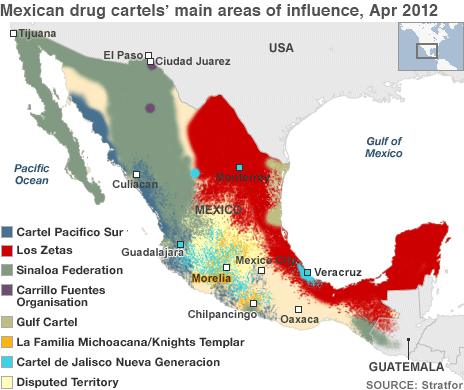Mexico's Zetas drug gang split raises bloodshed fears
- Published
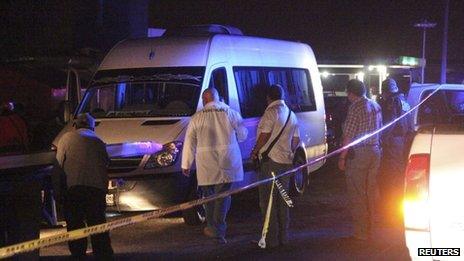
The survivor's tale reinforced reports of a split within the ranks of the Zetas
It was an extraordinary tale of escape. Last month, a man managed to survive a massacre in Mexico by playing dead.
He hid under the bodies of 14 other people shot and dumped in a minivan which the attackers then drove towards the city of San Luis Potosi. He made his escape when the vehicle full of corpses stopped for petrol.
But it soon became clear the survivor was no random victim. Rather, he was a member of the same organisation that had attacked him, the feared and violent Los Zetas criminal network.
It confirmed a troubling rumour in Mexico: that Los Zetas have split into two and the rival factions are now fighting each other.
Los Zetas started life in the late 1990s as enforcers for the Gulf Cartel. Tasked with protecting the cartel's drug-trafficking empire, the Zetas were primarily comprised of defectors from an elite unit of the Mexican army called El Gafe.
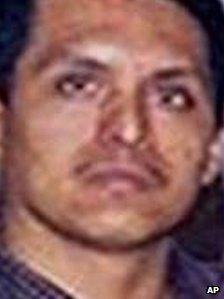
Miguel Angel Trevino is alleged to behind a series of brutal killings
By 2005, they had broken away from their paymasters and started to run criminal enterprises themselves.
Now, it seems the group has split again, this time internally.
One faction is led by one of the founders of Los Zetas, a former Gafe officer called Heriberto Lazcano, alias "El Lazca" or "Z-3".
The other is led by Miguel Angel Trevino, known as "Z-40", a former member of the Gulf Cartel who is thought to be responsible for some of the most heinous and bloodthirsty crimes committed by the Zetas.
Mexico's Attorney General Marisela Morales recently confirmed that reports from government intelligence sources indicated that the Zetas were now at war with themselves.
Such groups inevitably begin to "break up and start to divide", she said, calling the split "an important factor in the increase in violence" in northern states such as San Luis Potosi, Coahuila and Zacatecas.
Some local crime reporters have pointed to recent "narco-mantas" - banners put up in public places by drug gangs - accusing Heriberto Lazcano of betrayal as further proof of the split.
But despite the circumstantial nature of such evidence, most experts on the organisation agree that the rupture is real.
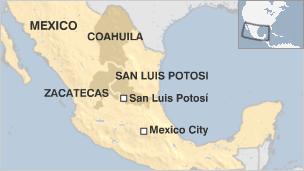
"I'm convinced that it's true," says George Grayson, co-author of All the Executioner's Men, a book about Los Zetas.
"Lazca and Z-40 are actually quite different. They seldom met, maybe just once a month. They communicated by cellphones which they then threw away after each conversation."
The two men inhabit different parts of the country, says Dr Grayson, and beyond their criminal partnership have little in common.
"Their common interests were fast cars, fast horses, fast women, fancy guns and hunting exotic beasts on a hunting reserve in Coahuila."
Of the two, Miguel Angel Trevino has the more fearsome reputation.
"Not that El Lazca is a saint, but Z-40 seems to get his basic enjoyment by committing the most incredibly sadistic acts," says Dr Grayson.
It was Z-40, for example, who is alleged to have been responsible for one of the most gruesome episodes in Mexico's drug war, when 72 people were tortured, raped and murdered on a ranch in San Fernando in Tamaulipas.
Under pressure
It is hard to know exactly why the split has happened now.
"(Los Zetas are) built from the ground up with very low barriers of entry into the money-making part of the business," says Steven Dudley, co-founder of Insight Crime, a web-based consultancy on organised crime in the Americas.
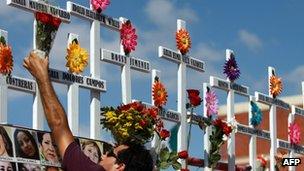
The Zetas have been blamed for an arson attack on a casino that left 52 dead
Any organisation set up this way will eventually "tear itself apart at the seams", he says.
"The Zetas are also under an extreme amount of pressure from law enforcement on both sides of the border, and they have been singled out by their rivals, who have created alliances to attack them."
For Dr Grayson, the split between Lazcano and Trevino is certainly not about ideology. The final trigger might have been something as trivial as an argument over a racehorse or a woman, he suggests.
Earlier this year, a profitable horse-breeding ranch in Oklahoma run by Z-40's younger brother, Jose Trevino, was shut down by the US authorities and he was arrested. This episode has been posited as a possible source of friction between the two men.
Meanwhile, the prospect of Zeta-on-Zeta violence fills people in some Mexican states with dread.
"If you have a car dealership in San Luis Potosi, and a Zeta commander comes in and asks for the weekly quota (bribe). Then another comes in and demands the same thing. Who do you pay? It must be a nightmare," says Mr Dudley.
The Zetas already operate like a franchise and are involved in more than 20 different criminal activities, from extortion to human trafficking. Low-level criminal gangs often seek to profit from their name and the fear it strikes into the general population.
"The Zetas as a brand-name may survive. But the changes within that organisation will be tremendous," Mr Dudley predicts.
The worry is that a lot more blood will be spilled along the way.
